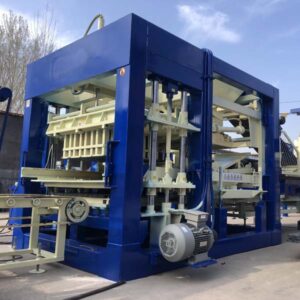
Title: **Seamless Construction: Integration of Full-Automatic Block Production with Construction Software Solutions**
Introduction:
The construction industry is undergoing a digital revolution, with technology playing a pivotal role in enhancing efficiency, precision, and collaboration. The integration of full-automatic block production with construction software solutions marks a transformative synergy, streamlining processes, optimizing workflows, and elevating the overall construction experience. This article explores the benefits and strategies behind integrating full-automatic block production with cutting-edge construction software solutions.
1. **Automated Production Planning:**
Integration with construction software enables full-automatic block manufacturers to automate production planning. Advanced planning algorithms can optimize block production schedules based on factors such as project timelines, demand forecasts, and resource availability. This ensures that the manufacturing process aligns seamlessly with construction project requirements.
2. **Real-Time Inventory Management:**
Construction software solutions integrated with full-automatic block production systems provide real-time visibility into inventory levels. This ensures that manufacturers and construction project managers have accurate and up-to-date information on block availability, reducing the risk of delays due to material shortages and optimizing supply chain management.
3. **Collaborative Project Management:**
Collaboration is key in construction projects, and integrating full-automatic block production with project management software enhances communication and coordination. This integration allows stakeholders to share project timelines, track milestones, and receive real-time updates on block production progress. This collaborative approach fosters better project synchronization and efficiency.
4. **Data-Driven Decision Making:**
Construction software solutions enable data collection and analysis at every stage of the construction process. By integrating with full-automatic block production, manufacturers can leverage data insights for informed decision-making. This includes optimizing production schedules, identifying areas for efficiency improvement, and adapting manufacturing processes based on real-time feedback.
5. **Quality Control and Assurance:**
Quality control is paramount in construction, and the integration of full-automatic block production with quality management software ensures adherence to standards. Automated sensors in the production line can collect data on block quality, and this information can be seamlessly integrated into quality control systems, allowing for swift identification and rectification of any deviations.
6. **Enhanced Traceability and Transparency:**
Blockchain technology integrated with construction software can enhance traceability and transparency in the full-automatic block production process. Every stage, from raw material sourcing to block delivery, can be recorded on an immutable blockchain. This ensures transparency, traceability, and accountability, addressing concerns related to the authenticity of materials and production processes.
7. **Energy Management and Sustainability:**
Sustainability is a growing concern in the construction industry. Integrating full-automatic block production with energy management software allows manufacturers to monitor and optimize energy consumption. This not only reduces operational costs but also aligns with environmental sustainability goals, demonstrating a commitment to eco-friendly practices.
8. **Predictive Maintenance for Machinery:**
Full-automatic block production involves complex machinery, and integrating with predictive maintenance software is essential. Sensors on manufacturing equipment can collect data on machine performance, and predictive maintenance algorithms can analyze this data to anticipate and prevent potential breakdowns. This proactive approach minimizes downtime and extends the lifespan of machinery.
9. **Mobile Accessibility for On-Site Coordination:**
Mobile integration with construction software ensures that stakeholders can access critical information, including block production schedules and inventory levels, from anywhere on the construction site. This enhances on-site coordination and allows for real-time adjustments based on changing project conditions.
10. **Cybersecurity Measures:**
With increased integration comes the need for robust cybersecurity measures. Full-automatic block manufacturers must prioritize the security of data transmitted between the production system and construction software solutions. Implementing encryption, access controls, and regular security audits are essential to safeguard sensitive information.
Conclusion:
The integration of full-automatic block production with construction software solutions represents a paradigm shift in the construction industry, fostering a more connected, efficient, and data-driven approach. By leveraging advanced technologies, manufacturers can streamline operations, enhance collaboration, and contribute to the overall success of construction projects. This seamless integration not only improves the efficiency of full-automatic block production but also positions the industry at the forefront of the digital transformation sweeping through the construction landscape.
